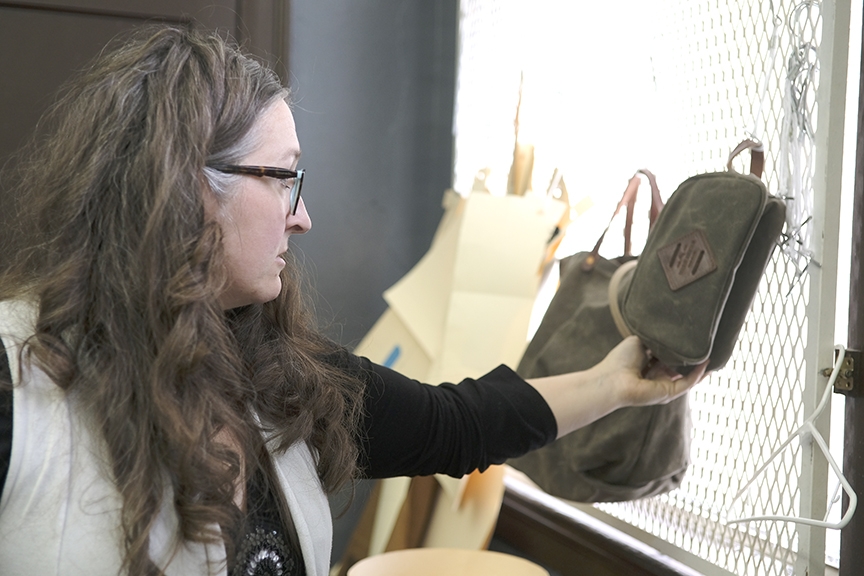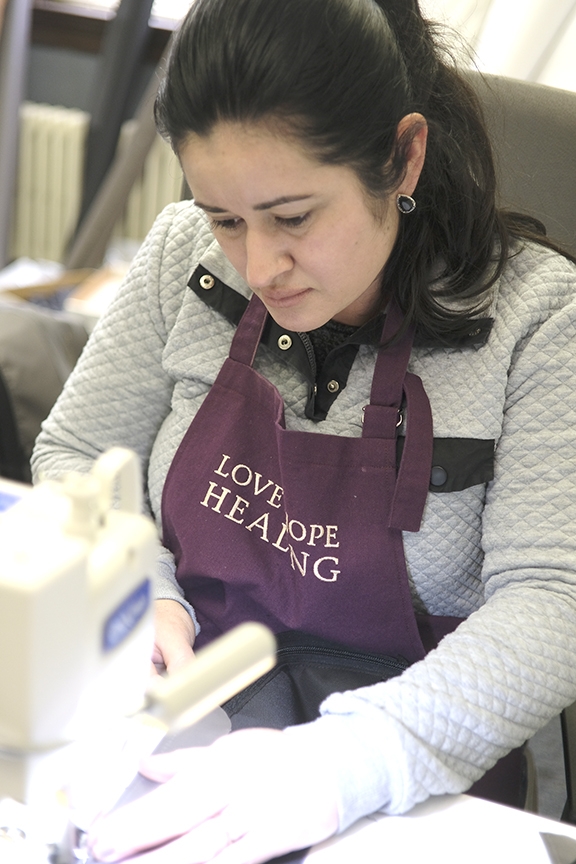
The C.E. McGruder Family Resource Center has proudly been serving the people of North Nashville for 20 years, providing basic needs services, and more.
Now, it’s preparing itself for the next 20 years, as it completes construction on the workforce development wing and continues to make updates to the building.
“We want to help people get out of crisis, get stabilized and self-reliant. Workforce development is that self-reliance piece,” said Greg Gabis, workforce development program manager. “We would like to be a hub for workforce development in Nashville where we bring all these folks who are doing great work together in one place where we can share resources, provide wraparound services, and really leverage each other’s strengths to produce something that is remarkable and unique and powerful and robust.”
Renovations, which were led by Capital Project Solutions Dowdle Construction, were made possible because of $2.3 million that were allocated to C.E. McGruder by the mayor’s office and the Office of Economic Development in 2018. Those funds were meant to help with renovations of the entire building. However, due to delays including those caused by the COVID-19 pandemic and supply chain issues, thereby raising the cost of products, work had to be focused on the new wing.
The new workforce development wing, which includes two workforce development classrooms, a computer lab, a Sewing Training Academy room, a sewing production room, a trades training room, an arts room, and a youth room, will be the new home of the various job training programs offered by Catholic Charities, Diocese of Nashville, who took over as the lead agency of C.E. McGruder in 2016.
Along with renovations of the rooms, updates also included putting in an elevator to make the wing more accessible.
Construction was completed in February and all inspections were completed by March 1.
Catholic Charities Programming
Catholic Charities has had a presence in North Nashville since 2008, providing basic needs services to those who needed it, explained John Michael Ford, Catholic Charities deputy executive director.
They took over as lead agency of C.E. McGruder in 2016, bringing with them not just its basic needs services, such as assistance with bills, food, and more, but also its job training programs – culinary training, sewing training, plumbing training, and training in the banking industry.
“Workforce development is really a great example of what we call enhanced programming,” Ford said. “What’s so special about the new wing is not only does it increase the capacity for workforce development programming, but it also allows us to bring in more wraparound programming such as counseling, case management, and short-term services.”
For example, if someone comes in for the Sewing Training Academy and it’s revealed that they might need assistance with rent or need help with childcare, Catholic Charities at C.E. McGruder can then provide those wraparound services, Ford said.
“Any one of those services is valuable, but to be able to do them together truly allows us to meet the client where they’re at and do our best to meet all their needs to the best of our ability,” Ford said.
Sewing Training Academy

One of the most successful and first job training programs Catholic Charities has offered is the Sewing Training Academy, which has graduated more than 250 students prepared for industrial sewing jobs since it began in 2015.
The Sewing Training Academy is a one-year instructional course that helps clients learn the skills they need to work in the field or become a sewing entrepreneur.
Trishawna Quincy, program director of the Catholic Charities Sewing Training Academy, has been leading the program since the beginning.
Throughout the year, students go through a production intensive course, learn about textiles, have opportunities to work on-site in manufacturing, learn how to sew with different types of garments, hear from industry professionals, and more.
“Students have all kinds of goals when they come in,” Quincy said. “We want to support those goals by providing those opportunities to them.”
“The new space, we’re so happy because we feel like we finally have a space that honors what we’re doing,” she added. “It’s a new space that our students can be proud to come to every day, and I can be proud to work in, and it gives us the room to grow, too.”
Along with the one-year Sewing Training Academy, Catholic Charities at C.E. McGruder also recently launched a modified version to help the Afghan and other new American clients whom Catholic Charities has been helping resettle.
It was through that program that Catholic Charities has been striving to help more graduates further their skills while also earning income by having them work in sewing production under Nora Brown, Catholic Charities production manager.
“We’re offering part-time jobs, which also give our students the ability to continue to train in a work environment. That’s been the missing link because classroom training can only go so far,” Quincy explained. “On-the-job training is what makes students truly successful, so a lot of students are able to incubate in the production facility for a little while to build up skill and speed before they either stay with us or go elsewhere.
“It’s really going to strengthen the program because we get to pay people to continue to learn while also bringing money in for the program through the production facility,” she said. “If we send somebody out right away before they have been able to incubate those skills, it’s not as helpful to our community, so the production facility opening is really exciting for what we’re doing and our overall mission and goals.”
“I’m so thankful that we have made really big strides in the growth of the program and the full vision is coming to fruition.”
Persevere
Along with the four training programs run by Catholic Charities, several other partnerships have been made including plans for a new construction component in partnership with the Tennessee College Access and Success Network and the Tennessee College of Applied Technology, and a coding program in partnership with Persevere for formerly incarcerated individuals or those who are impacted by the justice system.
“The workforce development wing is special because it gives us more of an opportunity to expand partnerships,” Ford said. “McGruder is so much more than just Catholic Charities, which is why we are grateful to be the lead agency there.

“There are a lot of Catholic Charities staff, 12 total, at McGruder, but it’s a big building with so many great partners,” he added. “Persevere is a great workforce development partner that is trying to expand their footprint in Tennessee and needs partnerships where they can co-locate their software coding classes and have access to clients. C.E. McGruder and the workforce development wing is the perfect spot for that because we’re able to provide space to them free of charge.”
Persevere is a non-profit agency that offers a 12-month coding program to those who have either been incarcerated or who are impacted by the justice system, meaning someone in their family is or has been incarcerated.
Persevere, through partnership with more than 70 organizations, including C.E. McGruder, was able to obtain a Tech Alliance Grant worth $15 million over the next three years to help them further reach those in underserved communities and help provide them jobs after completing the coding program, explained Anthony Glover, employment coordinator for the State of Tennessee. The program will be utilized in the workforce development wing’s new computer lab.
“Our plan is to help prevent the pipeline to incarceration, so we want to catch men and women who are in underserved, impoverished communities to help them enroll in our coding program, and then, through our coding program, earn an opportunity to earn a better living wage,” Glover explained. “We teach them the language that gives them a seat at the table to help drive their future.”
Coding is software development, he explained. The course is a 1,500-hour program over a one-year period that takes students through six certification modules that lead them to becoming full stack developers.
“We disrupt the cycle of poverty, we disrupt the cycle of reincarceration by helping graduates find meaningful work, and that’s what’s really going to make a difference in their lives, and that’s what this program does,” Glover concluded.
The first cohort began April 3. To apply, visit perseverenow.org and fill out the application. The application will then be sent to a case manager, such as Shaneeka Scott, who will help finish the process and enroll the candidate in the free program.
“This program is important because there are three different levels of prevention and there are really not a lot of resources in the community that help teach people who have been justice impacted or justice involved a different way of life completely free, no strings attached where they can make a really great living after a program,” said Scott, who is a case manager for Middle Tennessee. “For me, Persevere just teaches them a completely different way of life that also helps them gain that self-sufficiency on a completely different level.”
Continuing Renovations
Now that construction on the workforce development wing is complete, renovations will soon start on the main part of the building thanks to community members who reached out to the Metro Council requesting more funds for C.E. McGruder to finish the work needed including a new roof, new windows, an elevator for the main building, and more.
“This new grant will fulfill all the hopes and dreams of the 2018 grant and expand on even further,” Ford said. “It’s going to be more than we originally envisioned.”
Nicole Bailey, program manager for Catholic Charities at C.E. McGruder, said it’s important to make sure that they have the space to continue to serve the community.
“One of the things we talk about a lot is wanting to make sure that when the community comes here they feel like this is a welcoming environment,” Bailey said. “The center is first and foremost for the community and we want it to feel that way.”
In thinking about the community members who stepped up to make sure the renovations could continue, “it reminds me that I am leading a center that the community is strongly invested in, and because I know they’re strongly invested in this center, I feel that my decisions need to reflect their voices.
“I want them to be able to say we came to this center, we shared our concerns, and what we see now is the product of what we desired, and it’s serving us,” Bailey concluded. “We want them to feel like this is a place for them to come and feel at home.”









